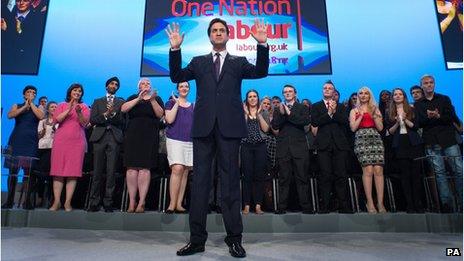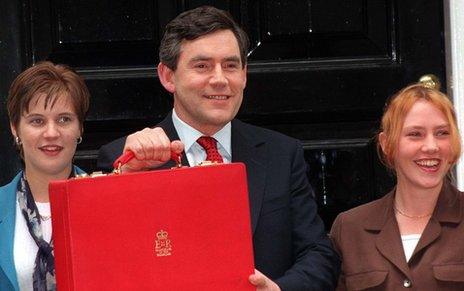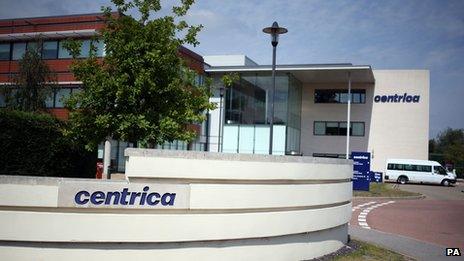Has Labour fallen out of love with business?
- Published
- comments

It is quite something for the market value of multi-billion pound companies to fall by more than 5% as a direct result of a speech by the leader of the opposition.
That is what happened yesterday to the share prices of Centrica and SSE, after Ed Miliband pledged to freeze power prices for 20 months from 2015 - if Labour were to win the next election. And their share prices are still falling.
Now there is bad and good news for Mr Miliband in that market reaction.
On the one hand, it proves the bleedin' obvious point made by Mr Miliband's critics, that capping prices in an industry subject to variable costs will significantly increase the cost of capital in that industry and deter investment (everything else being equal, the cost of capital rises as shares fall - sorry for the eggs tutorial, Grandma).
Which is why Mr Miliband will be whacked over the head repeatedly with the charge that he would be starving the energy industry of much-needed new generating capacity, unless and until he comes up with a plan to demonstrate that he isn't increasing the risk of the lights going out to any serious degree. (Here's more eggs stuff, Grandma - when it becomes more expensive to raise capital, it becomes more expensive to invest in big projects).
But - and here is the good news for him - while much of the chattering classes have been saying that Miliband has made himself unelectable by taking on Big Capital, investors would beg to differ.
The price falls at Centrica and SSE show that markets think there is a high probability Miliband will be Britain's next prime minister.
So although Miliband's panoply of new policies is to a large extent based on the idea that markets are frequently wrong, in this instance he presumably has to hope that they are irreproachable and immaculate seers.
Now Miliband may be hoping that the fuss being made by company bosses - and not just those of the power giants - over his proposal to temporarily remove the right to set energy prices, will in time die down.
He may be looking to relatively recent history for comfort in that regard, because in 1997, after the landslide election of New Labour, Chancellor Gordon Brown expropriated £5.2bn from the energy and utility companies in an almost unprecedented windfall tax.

Gordon Brown on the eve of his 1997 budget
And what was very striking was how little damage this raid on the utilities' coffers did to Tony Blair's heartfelt campaign to prove that his party was no longer the enemy of business or the rich.
What is the difference between then and now?
Well, for years after the energy companies were privatised by Margaret Thatcher, they were de facto monopolies, able to earn massive profits as a result of their relatively unchallenged power to set prices as they wanted - and therefore able to generate lavish rewards for their bosses, many of whom had been civil servants on bureaucrats' pay and rations only a few years earlier.
This was widely regarded as a scandal, not just by Labour but by what you might call the proper boss class of private-sector lifers.
So although the Tory government of John Major began to increase competition in the energy industry, through tougher regulation and forced break-ups of the biggest companies, there was very little sympathy anywhere when Labour said that the putative "excess profits" of these companies would be better deployed on a "New Deal" to help the young unemployed find work.
Hang on a sec, you may say. Don't the energy companies still have excessive market power, an unhealthy ability to generate whatever profits they choose and a propensity to pay their top people too much?
So why does it seem to be more controversial for Labour today to squeeze energy company profits through a price freeze than it was 16 years ago to do the equivalent thing via a tax raid?
For two reasons.
First, back in the late 1990s, there was less of an apparent crying need for investment to prevent brownouts and blackouts.
But, perhaps more importantly - and certainly more resonantly - Labour, in power for 13 years till 2010, was supposed to have sorted out the energy market, for the benefit of consumers.
Here of course is the most delicious irony of all.
The bosses of the energy companies would argue that Labour did a reasonable job of stimulating competition in their industry, to the benefit of households and the economy.

Centrica's shares have fallen since Ed Miliband's announcement
Which is why Miliband has to argue (by implication) that the last Labour government - of which he was an important member - failed comprehensively in that respect.
And there is another thing, in the territory of what you might call the inescapable reality of the different cabals and networks that run Britain.
What Miliband has to contend with, which Blair and Brown did not, is that those who run the energy companies these days are no longer regarded warily by the rest of the business establishment as cosseted newcomers to the private sector.
They are now fully paid-up members of the capitalist boss class. And their pain is therefore shared, empathetically, by most of those running big private sector enterprises.
That is why Peter Mandelson, perhaps the greatest evangelist of New Labour's entente with capital, warns today in the Guardian, external about the risks of being perceived as wanting to restrict important commercial freedoms.
In other words, the onus is now on Miliband to explain whether the energy price freeze would be the precedent for a much more interventionist industrial policy, with implications for all sectors and companies, or whether it is the rarest of exceptions based on the extreme structural flaws in energy.